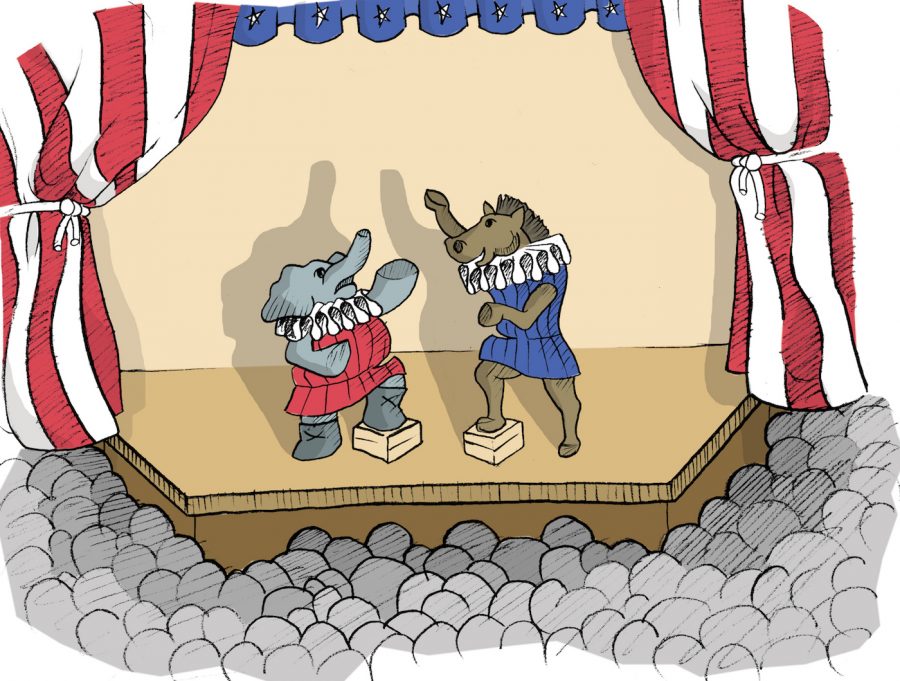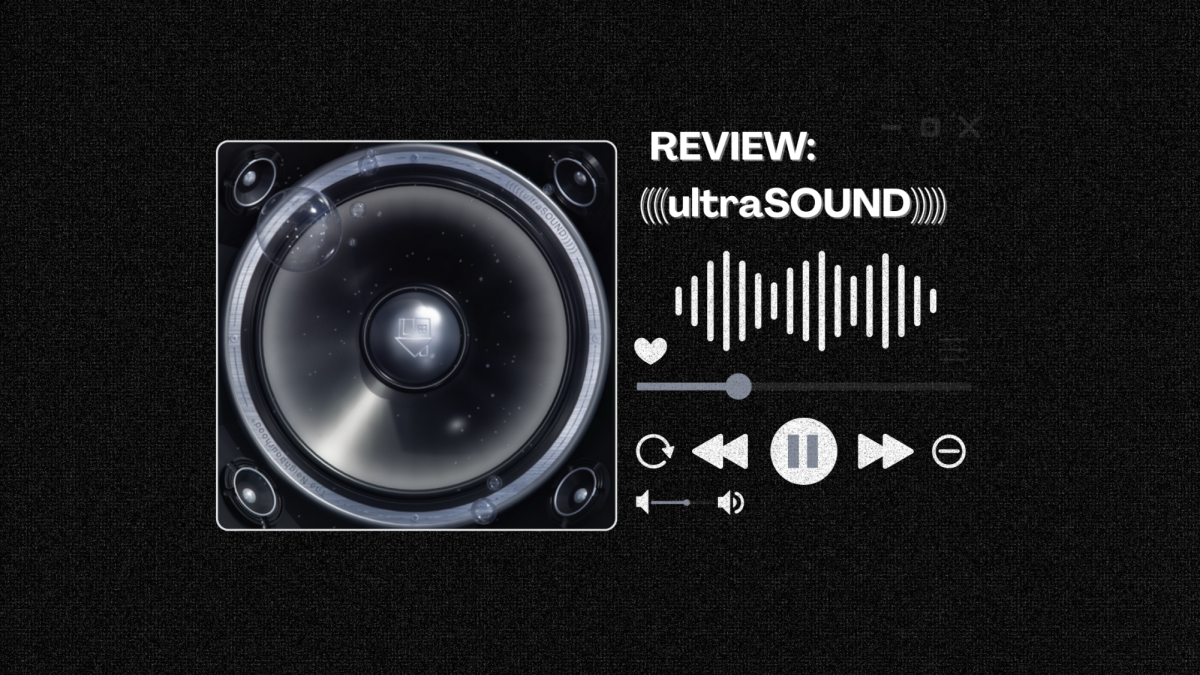Since the election, Sacramento State has been experiencing a very high amount of political activism on both sides of the spectrum — and the tension has no sign of letting up anytime soon.
In fact, each passing day of Donald Trump’s presidency has seen more and more pronounced, heightened emotions: anxiety and rage, disgust and self-righteousness, hope and pity.
How did we get here? And what’s next for a campus on the edge?
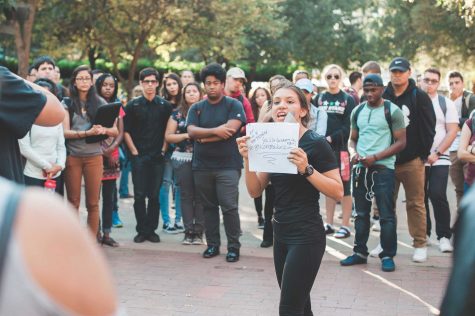
Act One
Just four months ago, it was a good time to be on the left.
Hillary Clinton’s presidential campaign did not exactly inspire the way Barack Obama’s did eight years earlier, but the surprising insurgency of Bernie Sanders in the Democratic primary removed the stigma from politically identifying as a socialist, and the Obama administration was pushing once undreamed-of initiatives like the recognition of Cuba and transgender rights.
And it looked like in spite of the rise of alternative left-wing parties, even Clinton would slide to an easy victory over Donald Trump — demonstrating that if the Republican Party were to move forward, it would have to reject the forces of reaction and reach out to Latinos, blacks, gays and other minority groups.
For Estevan Hernandez, a Sac State alumnus and member of the Peace and Freedom Party State Central Committee, it looked like all the political energy awakened in 2016 was going to change the American status quo.
“Today we have the Black Lives Matter movement, and we have Standing Rock, and now we have (Colin) Kaepernick refusing to abide by that national anthem,” he said in an Oct. 4 interview at a campus event featuring Peace and Freedom vice presidential candidate Dennis Banks. “There’s an alternative to capitalism. We don’t have to go to the two same old things over and over and over again.”
Ryan Brown, then-president of the Sacramento State College Republicans and a candidate for State Assembly against Democrat Kevin McCarty, was also optimistic about the future in spite of not supporting the GOP ticket.
“I’m not your standard Republican, but I think that in time that I will be because our party is changing,” Brown said in a Sept. 12 interview. “I’m openly bisexual. I’m pro-choice. I frankly don’t believe it’s the government’s business to be in people’s lives and to be legislating morality.”
But as the election results came in Nov. 8 and Trump was elected the 45th president of the United States, it became clear that both Hernandez’s and Brown’s visions of the future were about to face pushback not only from the new president, but from the millions of people who — in spite of the avalanche of predictions, pundits and polls — voted to ‘make America great again.’
The roles were cast. The stage was set.
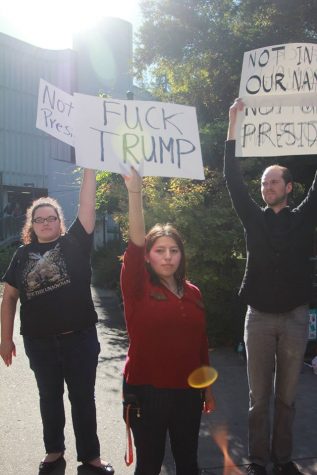
Act Two
As Sac State student Simon Hyatt was watching the election returns at Round Table Pizza in the University Union, he said he felt as though his “brain (was) exploding.”
“I was in absolute shock and terror as certain states began to fall,” Hyatt said. “(Trump) went from having a 20 percent chance of winning to a 66 percent likelihood.”
Hyatt and others aggrieved over Trump’s upset (on election morning, The New York Times gave Clinton an 85 percent chance of winning) bought posters, markers and descended on the Library Quad the next afternoon.
“(The protest) came about from the shock and despair that I felt last night and waking up this morning,” Hyatt said. “It’s not a nightmare we can wake up from. It’s our reality.”
Not everybody was in despair. Jared Paulin, donning a ‘Make America Great Again’ hat, stood on the sideline watching the protesters speak — sometimes in obscenities — against the man he’d voted for.
“It’s their right to protest. I respect the First Amendment,” Paulin said. “Everyone has their own opinion, but he’s the next president.”
But that library quad protest was only the beginning. Students marched on the State Capitol later that night, to President Robert Nelsen’s office the next month, blocked downtown streets on Inauguration Day and the next day for the 20,000-strong Women’s March on Sacramento.
Sac State alumnus and political activist Jamier Sale said that, far from silencing leftists, the Trump victory and the obstacles it poses to the left have only ratcheted up the election’s energy.
“When people got involved in the Trump protests, they were also hearing messages related to Standing Rock, Black Lives Matter (and) clean water,” Sale said. “It’s not just Trump; it’s the system. Trump is just a representative.”
The failure of traditional political institutions to prevent a Trump victory has led people to explore alternatives, Sale said.
“A lot of people who used to be on the Democratic Party side are moving to the left — toward a more radical politics,” Sale said. “Throughout history, all the changes as far as society and human rights have started when people organized. It’s only when people stand up for their rights — not when a politician gets elected.”
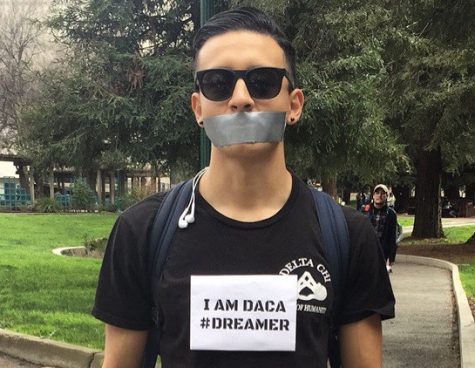
Act Three
Trump announced his presidential candidacy by promising to deport millions of people who are residing in the U.S. illegally — making it no surprise that Sac State’s undocumented students have spent the last several months wondering what happens to them next.
The school has hosted several workshops on the rights of the undocumented, particularly those who are currently participating in Deferred Action for Childhood Arrivals (DACA), an Obama executive order that effectively shields some undocumented people from deportation on a two-year basis.
The Dreamer Resource Center has been holding immigration consultations and policy briefings each Monday at noon.
But one of the challenges of consultations has been conflicting statements from Trump and his team on when, or if, DACA is going to be undone.
“We continue to be in this limbo, this phase of uncertainty,” said Viridiana Diaz, the director of the College Assistance Migrant Program at Sac State at a Jan. 23 event with an immigration attorney.
One of those uncertain students is Everardo Chavez, who participated in A Day without Immigrants on Feb. 16 by staying silent all day, wearing gray masking tape and wearing two signs on his torso: ‘I am DACA #Dreamer’ and ‘My name is Everardo Chavez Perez and I was deported today.’
Chavez said he got the idea to protest after hearing about the arrest by Immigration and Customs Enforcement (ICE) of a DACA participant in Washington.
“He’s been here since he was 6 (years old), works, no criminal record,” Chavez said. “The fact that he was detained made me think, ‘That’s me. I’ve been here since I was 6 or 7 years old. That could have been me.’ I broke down, started balling my eyes out.”
Chavez said that he didn’t receive negative reactions from students on campus. That good will, however, did not spill over when he posted about his protest on Twitter, where Chavez became the target of both ethnic slurs and comments such as “i’d rip that duck tape off your face so hard and laugh when you start crying.”
Chavez said that insults are not new to him — but that he’s learned to turn them around because he knows that people’s fears do not represent who he is.
“It built me up. I know I’m not all those things who they’re saying, like a criminal,” he said. “It made me proud of who I am even more. I turn them around and use them as a positive push.”
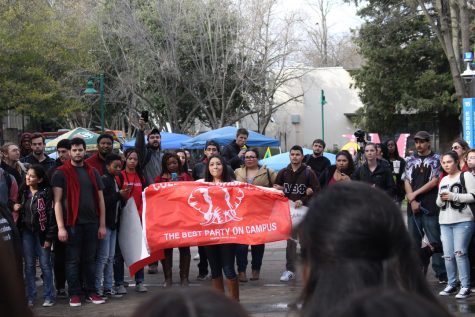
Act Four
Trump’s travel ban, which has since been ruled unconstitutional, sparked a campus march on Feb. 2 consisting of hundreds of students chanting “no ban, no wall.”
But some Sac State students were tired of being lectured to by fellow students, professors, Facebook interlocutors and TV talking heads about the supposed evils of Trump. And they wanted to have their say, too.
So about 10 members of the Sacramento State College Republicans staged a counter-protest, waving a flag — ‘College Republicans: best party on campus’ — and chanting ‘build the wall, protect us all.’
“It was our right for free speech as well,” said Mason Daniels, who replaced Brown as the president of the College Republicans. “We should be heard as well.”
At several points during the march, the counter-protesters stood in front of the ‘no ban’ protesters with a phone video camera rolling.
Muslim Student Association Vice President Amer Tere stood in front of them, directing the demonstrators around them.
“We broke upon them like the river upon a rock,” Tere said.
Not all the demonstrators were so subtle — Sale walked right into them. And one College Republican, Floyd Johnson, is pressing charges against a protester who he alleges shoved him as he was attempting to enter a circle of protesters in the Library Quad.
“One person I heard said, ‘learn your history,’ and I said, ‘I do know my history,’ and she called me a ‘token’ n-word,” said Johnson, who is black. “It’s hurtful because it suggests I have to fall in line. A lot of black people are called ‘Uncle Toms’ just because they’re conservatives.”
A woman who wished to remain anonymous also grabbed the ‘best party on campus’ flag with her umbrella handle.
Daniels said that the response to the Republican presence at the protest shows that members of his party are the victims of discrimination.
“People do not feel safe about being a Republican on campus,” Daniels said. “People don’t speak up in classes, for one, because professors will shut them down. If you have a slightly different opinion to the right, you get called ‘fascist,’ ‘racist,’ ‘bigot,’ (or) ‘piece of s—.’ ”
In a letter to the editor of The State Hornet on Feb. 3, Daniels called for Nelsen and ASI President Patrick Dorsey to resign if they did not condemn violent protests at UC Berkeley on Feb. 1 against so-called “alt-right” provocateur Milo Yiannopoulos.
Yiannopoulos had been making the rounds at several California colleges, and according to Daniels, Sac State may soon be on his itinerary.
“I can make it happen,” Daniels said. “I got the connections.”
Daniels said he would make a final decision on the invite after a Feb. 17 meeting with Nelsen and Dorsey.
As of press time, Daniels has not answered multiple attempts to contact him from The State Hornet.
Brown said in an interview Tuesday that he doubts Yiannopoulos will come to campus after a video came to light on Sunday in which he defended sexual relationships between teenage boys and older men. Brown also commented on the deterioration of political discourse on campus since the election.
“I’ve always seen Sac State as an open campus for people of different political opinions,” Brown said. “Having things like the n-word thrown at a black Republican because of his views — it’s disgusting.”
Brown also said that his views of the Republican Party’s future have changed since September.
“I was a little more of an optimist. I saw what I wanted to see,” Brown said. “To be fair, President Trump kept President Obama’s LGBT executive order. … I can see the party moving more in that direction, but at the same time the incredibly divisive rhetoric on racial, ethnic, religious and xenophobic issues that I see is disheartening.”
So how will Act Five begin? The actors will decide how far they are willing to go to prove their points.
Political polarization in American life is nothing new, but the strength of the feelings on both sides is. According to a Feb. 16 survey from the Pew Research Center, of the 56 percent of Americans who disapprove of Trump’s job performance thus far, 46 percent ‘strongly disapprove.’ Of the 39 percent who approve, 29 percent ‘strongly approve.’
Even though it is situated in the middle of solidly blue California — which went Democratic in 2016 more than any other state except for Hawaii — Sac State has turned into a microcosm of America’s widening divide, a miniature version of a nation in distress.






























































































































